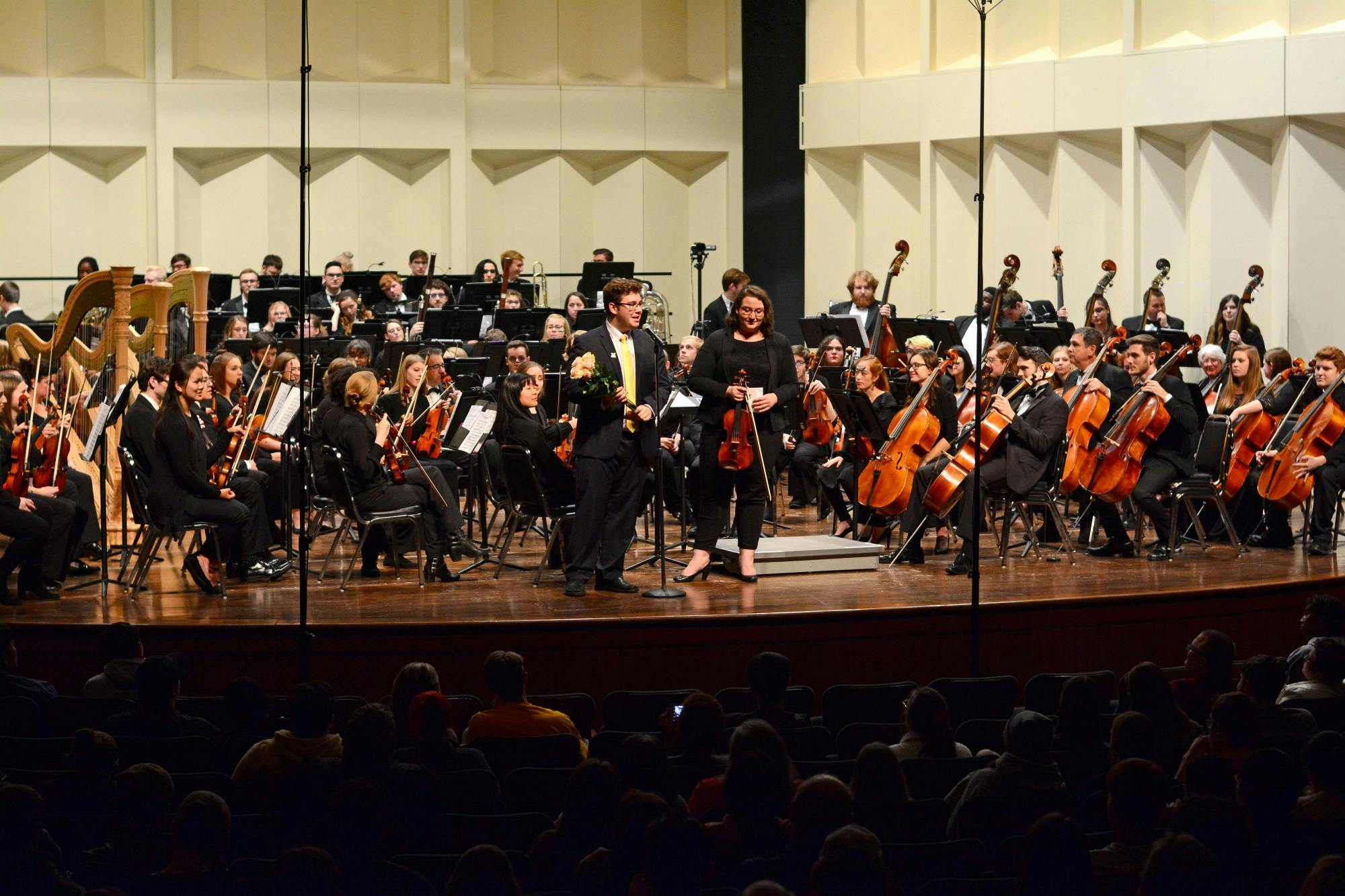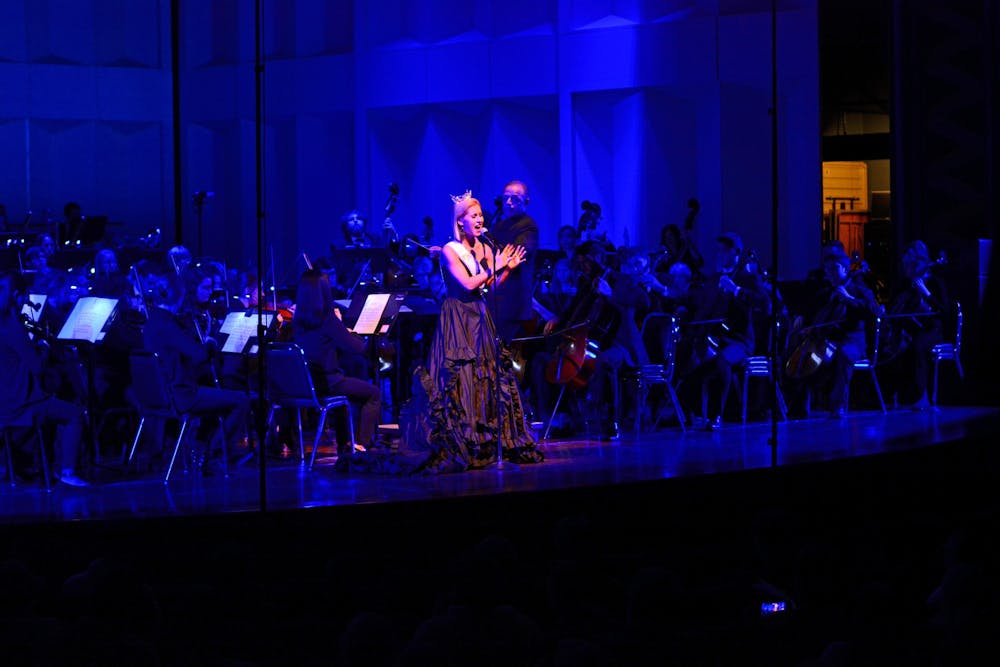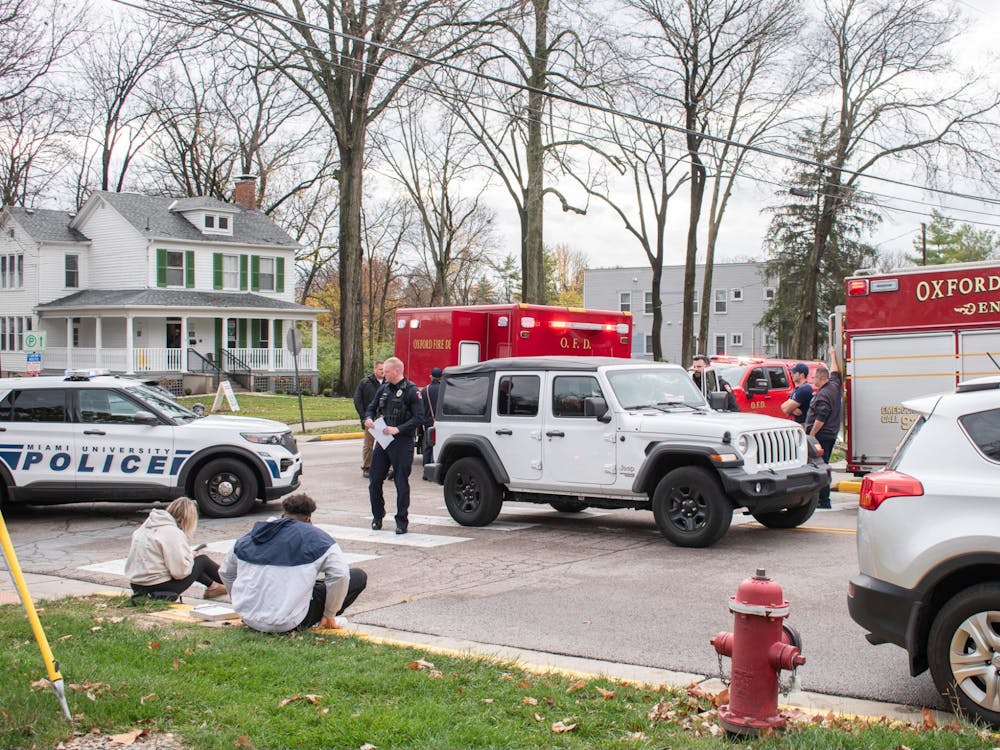Audience members reached for their pockets to make sure their phones were on silent as the sounds of violins being tuned filled the auditorium. Soon the sharp notes were joined by various woodwind instruments, prompting audience members to lower their voices and quiet side conversations.
As the lights began to dim, the orchestra drew its warm-up routine to a close. The audience followed suit and turned to focus all attention on the stage.
Let freedom ring.
The Miami University Symphony Orchestra and the Department of Music put on their “The Two Faces of Freedom” concert on Monday, Nov. 25 at Hall Auditorium.
The concert’s name was inspired by the two central pieces that showcased different meanings of freedom.
The first piece, “Urban Legends,” was composed by Michael Abels. Abels recently did the scores for Jordan Peele’s films “Get Out” and “Us.” The piece was aided by four members of the Cincinnati Symphony Orchestra Fellows String Quartet.
Conductor and director of orchestral studies Ricardo Averbach was inspired by his experience on the organizing committee of the recent Freedom 55 conference in Cincinnati, and he wanted to translate that by selecting Abel’s piece to perform.
“I thought we should go beyond just having the conference in Cincinnati,” Averbach said.
So Averbach brought Freedom 55, and Abel’s piece, to Miami.
After “Urban Legends”, Miss Ohio winner and upcoming Miss America contestant Caroline Grace Williams sang the aria “O mio babbino caro” from the opera “Gianni Schicchi.”
The concert culminated with “Symphony No. 5, Opus 47” by Dmitri Shostakovich. The composition was written in response to Shostakovich and his music was ostracized from public opinion after a scathing editorial in the Soviet Union’s Pravda newspaper, according to the concert playbook.
Averbach explained that the composition was also written during Stalin’s rule of the Soviet Union.
Enjoy what you're reading?
Signup for our newsletter
“[The piece] was written in a moment when Russians were going through the most oppressive regime they ever had,” Averbach said. “People were being killed and disappearing.”

First-year music education major Sarah Perry detailed the complexity of the nearly 50-minute piece.
“[This piece] was a feat for any orchestra,” Perry said. “Especially a non-professional orchestra of mostly students.”
In the concert booklet, the performance of Shostakovich’s symphony was dedicated to Professor Henry Orlov, a personal friend and colleague of Averbach. Orlov wrote a book on Shostakovich’s symphonies and his death inspired Averbach to lead his orchestra in a performance of “Symphony No. 5”.
“I’ve been wanting to perform Shostakovich here at Miami for the past 18 years,” Averbach said. “But I never had an orchestra capable of playing this music.”
Averbach knew that with this complex of a piece, he needed to expand his orchestra. Miami graduate Monica Hill revealed that Averbach reached out to her and her fellow alumni in an email.
“He asked us to come and play this great piece,” Hill said. “Most of us said yes because playing something this large-scale is a wonderful opportunity.”
The concert had been in the works since the second week of October. The orchestra was on an intensive rehearsal schedule for three times a week, and the students took it upon themselves to extend their practice outside of rehearsal.
“I practiced around an hour or an hour and a half daily over the course of six weeks,” Perry said.
The “Two Faces of Freedom” concert demonstrates Averbach’s efforts to keep orchestral music relevant to today’s world by contextualizing universal themes like freedom in choosing his pieces.
“I think it’s always good to take those lessons from the past,” Averbach said. “And [I want to] keep remembering and seeing how they apply to today.”
Even students outside of the music program enjoyed the concert and the meaning behind each piece. Sophomore psychology Andrew Martinez was impressed by the dedication of all the performers and not just the student ones.
“Some of those people are going to be playing these instruments for the rest of their lives,” Martinez said.
It’s crazy how passionate they are, he added.
While Averbach was conscious that his students were a little nervous about taking on these complex pieces, he left them with a little piece of advice before showtime.
“It’s better to make mistakes than to play tentatively,” Averbach said. “If you’re going to make a mistake, just make it.”




